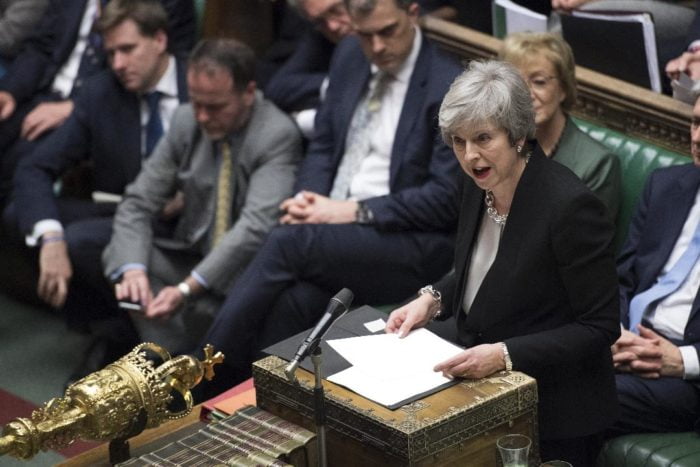Prime Minister Theresa May promised on Tuesday to allow parliament to delay Brexit by up to three months to avoid Britain crashing out of the European Union without a deal on March 29.
The dramatic reversal in May’s steadfast strategy came after threats of mass resignations from her own ministers and calls for a second referendum on Britain’s EU membership from the main opposition Labour Party.
It saw the pound rally to its highest level since May 2017 against the euro — and since October 2018 against the dollar — as investor fears of imminent trade gridlock and financial market mayhem eased.
But the change in course angered Brexit hardliners in May’s own Conservative Party. Influential MP Jacob Rees-Mogg warned that “any delay to Brexit is a plot to stop Brexit”.
The announcement also did little to draw London and Brussels closer to an agreement over how to end a 46-year partnership that Britons narrowly voted to end in a June 2016 referendum.
The beleaguered British leader told parliament she would offer MPs the chance on March 14 to back a “short, limited” extension of the Brexit deadline if her own divorce proposals fail to win the support of lawmakers by March 12.
But she also stressed that she wanted to leave the bloc on time.
“Our absolute focus should be on working to get a deal and leaving on 29 March,” May said.
The government also published un updated assessment of Britain’s preparedness for a no-deal outcome that identified risks of serious disruption.
The assessment found that only 40,000 out of the 240,000 businesses that require a customs registration number to continue trading with the European Union had obtained one.
It warned that some food prices were likely to increase — particularly for fresh fruit and vegetables — and that this could “exacerbate, or create, shortages”.
May laid out a three-step procedure that begins with a vote in parliament on her latest Brexit proposals by March 12.
Their refusal to back her would see lawmakers confronted with the option of leaving the EU club without an agreement.
That measure’s expected defeat would see parliament vote on March 14 on a deadline extension.
The other 27 EU leaders would need to unanimously approve a delay by March 29.
May stressed that any extension would be short, “not beyond the end of June”.
Any further delay would mean the UK taking part in upcoming European Parliament elections.
The EU has been watching with growing concern the political machinations in Britain and the possibility that the country will crash out of the bloc without a deal, risking chaos on both sides of the Channel.
European Council President Donald Tusk said Monday after meeting May on the sidelines of an EU-Arab summit in Egypt that an extension would be a “rational solution”.





